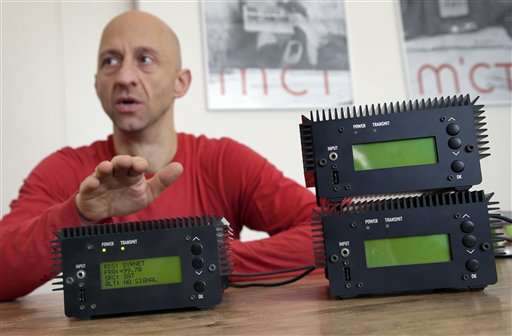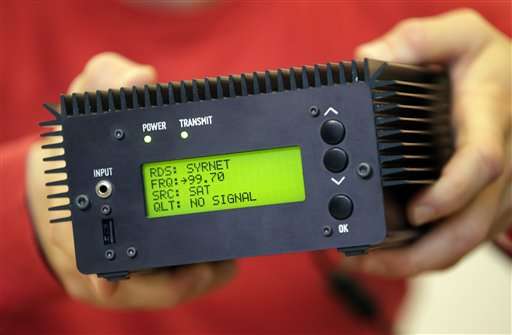Radio rebels: Berlin group makes tiny transmitters for Syria

On the top floor of an old brick building in the heart of Berlin, a group of journalists and tech enthusiasts are working to spur the Syrian media revolution.
Their weapon is an unassuming black case the size of a shoebox that allows opposition radio stations in Syria to transmit inside hostile territory.
Dubbed PocketFM, the device is basically a low-powered radio transmitter. Coupled with a satellite dish to receive new programs, a car battery for power and a one-meter (three-foot) antenna, it can broadcast FM radio within a 5-kilometer (3-mile) radius.
That's enough to cover a town or a city district, said Philipp Hochleichter, who oversees development of the device for the Berlin-based nonprofit organization Media in Cooperation and Transition.
The group has been training journalists in conflict zones for more than a decade and often relies on FM radio to reach populations in far-flung areas that don't have access to the Internet or smartphones. But when the group realized that shifting front lines and the brutal treatment of journalists meant operating large broadcast antenna could become too cumbersome or risky, it developed PocketFM.
It's now being used to covertly broadcast in nine locations, including two that are controlled by the Islamic State group, said Hochleichter. Connected to a solar panel, a PocketFM transmitter can theoretically work autonomously for long periods of time.

The project, which also includes compiling a daily best-of from nine cooperating radio stations that is beamed down by satellite, is financed by the German Foreign Ministry. It cooperates only with moderate opposition groups who have to abide by a code of conduct.
"Of course it's necessary for us to make sure they don't fall into propaganda scheme, which is very tough in Syria at the moment," said Najat Abdulhaq, a Palestinian journalist who manages the project.
Listeners might be surprised to find that aside from urgently needed information—which borders are open, what are the prices in the market, how are refugees abroad faring—there's a fair amount of light entertainment.
"People have a day-to-day life despite conflict," said Abdulhaq. "Despite the sadness and the war, people like to listen to music and even comedy."
Hochleichter said Monday the group is currently working on its third version of PocketFM, which it hopes to complete by the middle of next year. As with previous versions, the technology is decidedly low key, with a $40 Raspberry Pi computer at the heart of the device.
"We're not a hardware company that's got $100,000 to develop new technology," Hochleichter said.
The next version will be slightly more powerful and boast a new security feature that allows users to remotely switch off the device by text message to prevent it being traced.
With the war in Syria running for almost five years, the third version is almost certain to see use.
"I wish, but I would be very naive if I would believe, that the conflict would be over next year," said Abdulhaq.
____
Syrnet: www.syrnet.org/
© 2015 The Associated Press. All rights reserved.


















